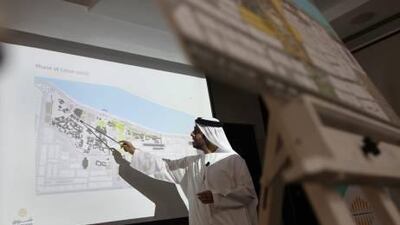SHARJAH // Contractors are racing against time to finish the first phase of Sharjah's five-stage redevelopment project before the 10th Sharjah Biennial in April.
Most of the work on the first phase of the Heart of Sharjah project is complete, according to Marwan Jassim al Sarkal, the chief executive of the Sharjah Investment and Development Authority (Shurooq).
This means that curators and artists can look forward to exhibiting at the Sharjah Art Foundation's new home during the Biennial.
Mr al Sarkal said that complications arose during the rebuilding of some of the older houses, work that required a lot of care and attention.
Shurooq is working with experts including the International Centre for the Study of the Preservation and Restoration of Cultural Property (ICCROM) and the Sharjah Academy for Scientific Research to develop a new method of rebuilding old houses, one that makes use of traditional techniques but provides extended durability.
"The Heart of Sharjah project aims to add attractive points of leisure and tourism that further develop the heritage of our emirate and enhance its position in the region," he said.
He said much of the focus had been on creating a unique space for retailers, which is a key component of the project.
"We are also building decking for the abra boats on the creek side, which are considered an important part of Sharjah's history and heritage, and a big draw for tourists."
In addition, the plan includes "upgrading the abras themselves to conform to higher standards of safety", Mr Al Sarkal said.
Phase One of the Old Town renovation, which is scheduled for completion in 2013, includes work at the Sharjah Art Foundation, rebuilding the Al Shanasiah Souq and making modifications along the Corniche.
The regeneration plans include demolition of buildings that fall within the boundaries of the Heart of Sharjah project and do not fit in with the overall historical atmosphere of the area.
The first phase of the project also involves rebuilding residences near Al Hisn Sharjah Fort, which once housed the ruling family of Sharjah, redeveloping the houses behind the Al Zahraa Mosque in Al Muraijah, and the conversion of the Al Midfaa family home into a hotel.
Many other old houses will be converted into hotels, museums, retail shops and restaurants.
These changes and upgrades are all planned with the aim of bringing the Al Hisn area in line with its status as a heritage site.
Upgrades will also take place at the Saqr and Al Arsa souqs, which will receive new lighting before being joined together by the reconstruction of Al Shanasiah souq, which once sat between the two.
In support of these improvements and new developments, a number of roads will be upgraded, closed or diverted, in several stages and phases.
Sharjah Corniche Road will undergo intensive redevelopment, while Bank Street will be redesigned in order to serve the new master plan of the whole project.
In addition, other roads will have some diversions during the development project, according to Wael al Masri, chief architect of the project.
"We have conducted studies to sort out the traffic congestion and allocate enough parking slots for all residents and visitors," he said.
"This multi-phase project aims to bring the whole area back to its past glory, making the emirate a destination for those looking to experience the Gulf as it once was, without losing out on modern artistic touches."
The project's five phases are scheduled to conclude in 2025.
In total, the project's series of ongoing development works have the overall aim of reviving the historic and heritage areas and transforming Sharjah into a significant tourism and trade destination with modern contemporary artistic touches.

